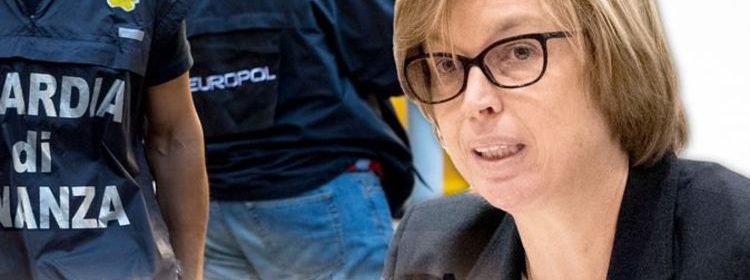EU at ‘breaking point’ as criminals exploit Covid crisis to abuse bloc, Europol boss warns

'The perfect scam': Europol boss calls for regulation on Bitcoin
When you subscribe we will use the information you provide to send you these newsletters. Sometimes they’ll include recommendations for other related newsletters or services we offer. Our Privacy Notice explains more about how we use your data, and your rights. You can unsubscribe at any time.
Europol has claimed that increasingly violent criminal gangs are likely to muscle in on legitimate businesses left vulnerable by the coronavirus pandemic. The Hague-based crime fighters also warned of a new market for fake vaccines and home-testing kit as crooks seek to take advantage of the global health crisis. Catherine De Bolle, Eurpol’s director, said: “We are at the breaking point.
“The impact on the lives of citizens, on the economy, on the rule of law is too big… That’s what we see from this report.”
She was speaking as the EU agency releases its four-yearly report on the state of the bloc.
The 87-page “Serious and Organised Crime Threat Assessment” will be used by member states to set crime-fighting priorities until 2025.
It warns that a “prolonged pandemic will put heavy strain on European and global economies” and the forecast recession “may shape serious and organised crime for years to come”.
Pandemic-stricken businesses are now vulnerable against criminals looking to take advantage of them to aid their illegal activities, the Europol report added.
Ms De Belle warned that enterprising mobsters had changed their own habits in order to make the most of coronavirus-driven markets.
She said: “In the early stages we saw a surge in the trade of counterfeit face masks and hand sanitiser.
“Now we see a rise in the trade in fake vaccines and home testing kits.
“These vaccines are a risk for your health. You should not buy them.”
The Europol chief noted that there had been an increase in cybercrime as coronavirus restrictions mean people have been working and living more online.
“Critical infrastructure will continue to be targeted by cybercriminals in the coming years,” the agency’s report said.
“This poses a significant risk.”
MUST READ: EU official throws tantrum over vaccine contracts: ‘UK has worst terms
Online fraud, malware phishing attacks and online sexual exploitation are now considered major problems across the EU.
Cybercriminals are also likely to launch “sophisticated and large-scale attacks against critical infrastructure to access and steal sensitive data” as the world spends more time online.
Lockdown across Europe has also seen the purity levels of cocaine illegally arriving on the Continent soar.
Europol said: “Unprecedented quantities of cocaine are trafficked to the EU from Latin America, generating multi-billion-euro profits.”
DON’T MISS
Brexit LIVE: UK nears breakthrough in hated Northern Ireland deal [UPDATE]
AstraZeneca ignores letter of complaint from von der Leyen [INSIGHT]
Thank God for Brexit! Brits praise EU exit for jab roll-out [POLL]
Europol chief worried cyber attack could spread on Monday
And purity levels are “at the highest level ever recorded in the EU”, the agency added.
The cocaine trade “fuels criminal enterprises that use their enormous resources to infiltrate and undermine the EU’s economy, public institutions and society”.
Police raids in EU ports, such as Antwerp, Hamburg and Rotterdam, has seen record seizures of the class A drug.
The hauls include a shipment of 23 tonnes of cocaine located by Dutch and German policy in late February.
Ms De Bolle said the increased activity in the drugs trade had seen criminals turn more violent.
“They are now not afraid to use funs, hand grenades and torture,” she said.
EU commissioner Ylva Johansson said: “Seventy percent of criminal groups are active in more than three member states.
“Organised crime groups are professional and highly adaptable as shown during the COVID-19 pandemic.
“We must support law enforcement to keep up, offline and online, to follow the digital trail of criminals.”
Source: Read Full Article




